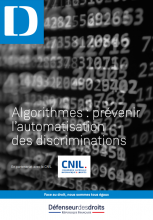
France
Digital tools, the use of which has increased with the current health crisis, are often based on algorithms without the general public always being aware or informed. Now used in areas such as access to social benefits, the police, justice and recruitment, they are a source of progress, but also carry risks for fundamental rights, as the Defender of Rights and the CNIL (French Data Protection Authority) have already pointed out.
Behind the apparent neutrality of algorithms, research has revealed the extent of the biases that can occur during their design and deployment. Like the databases that feed them, they are designed and generated by humans whose stereotypes, by being repeated automatically, can lead to discrimination.
Considering that this issue should not be a blind spot in the public debate, the Defender of Rights, in partnership with the CNIL, brought together specialists, researchers, lawyers and developers on 28 and 29 May to discuss the issues of algorithm transparency and discriminatory bias. All the experts pointed out the considerable risks of discrimination that their exponential use can bring to bear on each and every one of us, in all spheres of our lives.
In order to prevent such discrimination, correct it and punish the perpetrators, the Defender of Rights calls for a collective awareness and urges the public authorities and the actors concerned to take measures to prevent discrimination from being reproduced and amplified by these technologies.
The Defender of Rights, in partnership with the CNIL, proposes the guidelines detailed in this document.
The phenomenal development of algorithmic technologies and learning systems requires institutions to remain vigilant about the consequences of these technological developments, but also to anticipate them, to enable democratic debate to take place in an informed manner, while at the same time devising a legal framework and regulation that protects rights and freedoms.
The Defender of Rights and the CNIL will continue their reflections on this subject and will contribute to those of public decision-makers. In this perspective, their compass can only be the will to guarantee everyone respect for their fundamental rights, and in particular the right not to be discriminated against and the protection of their personal data.